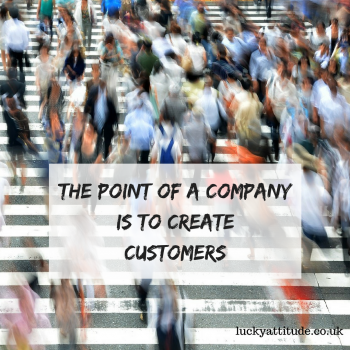Customers: More Important Than CEO?

The CEO is one of the most important person in a company, together with senior management.
But which stakeholders’ needs should be met first, when there is a conflict and one has to be prioritised over another?
Here’s my suggested order:
1. Customers
The purpose of a company is to create customers, so the customer needs have to come first. Without customers paying you, you wouldn’t have your business in the first place.
(And customers can always choose to buy from a competitor.)
Genuine customers are the best brand influencers. Their recommendations and enthusiasm is central to word of mouth, which is crucial to the long-term sustainability of the business.
Even if the CEO have the winning ideas to take the business to another level, it’s still the actions of the customers that decide when and how quickly those progressions occur.
In an ideal world, the company’s CEO will remain for many years, but sometimes it is not the case. Headhunters like www.norriejohnstonrecruitment.com make finding the perfect CEO and other senior management a fairly simple task.
Conversely, once you’ve lost customers, getting them back on your side, can be impossible.
Unhappy customers can result in damaged reputations. Once this happens, anything the CEO does, can be futile.
2. Employees
Everyone talks about building a relationship with their customers. I think you build one with your employees first, because if you take care of your people they will, surely, take care of your customers.
This is just common sense.
The employees are ultimately those, who create, deliver, or market the products or services, that the customers buy.
Employee-driven culture is more important than ever, because people have more choices. Staff are not obligated to work at one organisation, if they are not treated well. They can just move on to work for a competitor.
If you want to attract and retain top talent, you have to offer them attractive work conditions.
A strong CEO can have a huge influence on the company’s culture, but its impact on the business is still reliant on the employees action. Without the right people to turn ideas into action, the CEO’s vision is almost insignificant.
The importance of HR and employment law features can be read at www.elliswhittam.com. So, while the chief executive is very much at the top of the pile, their impact is only made possible by empowering the staff.
3. Shareholders / Investors
A shareholder can be a person, company, or other institution that owns at least one share of a company’s stock.
Shareholders reap the benefits of the company’s financial incline in the form of increased stock value on the financial market.
The duty of the board of directors (every public company must have a board of directors) is to hire the CEO and senior management team, to maximise shareholder value.
The board of directors is elected by the corporation’s shareholders, and is considered responsible to them, not the founders of the company.
4. Founders & CEOs
A founder is a person, who forms an idea, product, or company. The founder is the first owner of the company at the moment of incorporation.
Founders can be CEOs if they have the skills & desire to lead the business, but often, these require two different mindsets. Founders are driven by solving problems and CEOs are driven by money and accumulating wealth.
CEOs are appointed by a board of directors, often temporary, founders are forever 🙂
